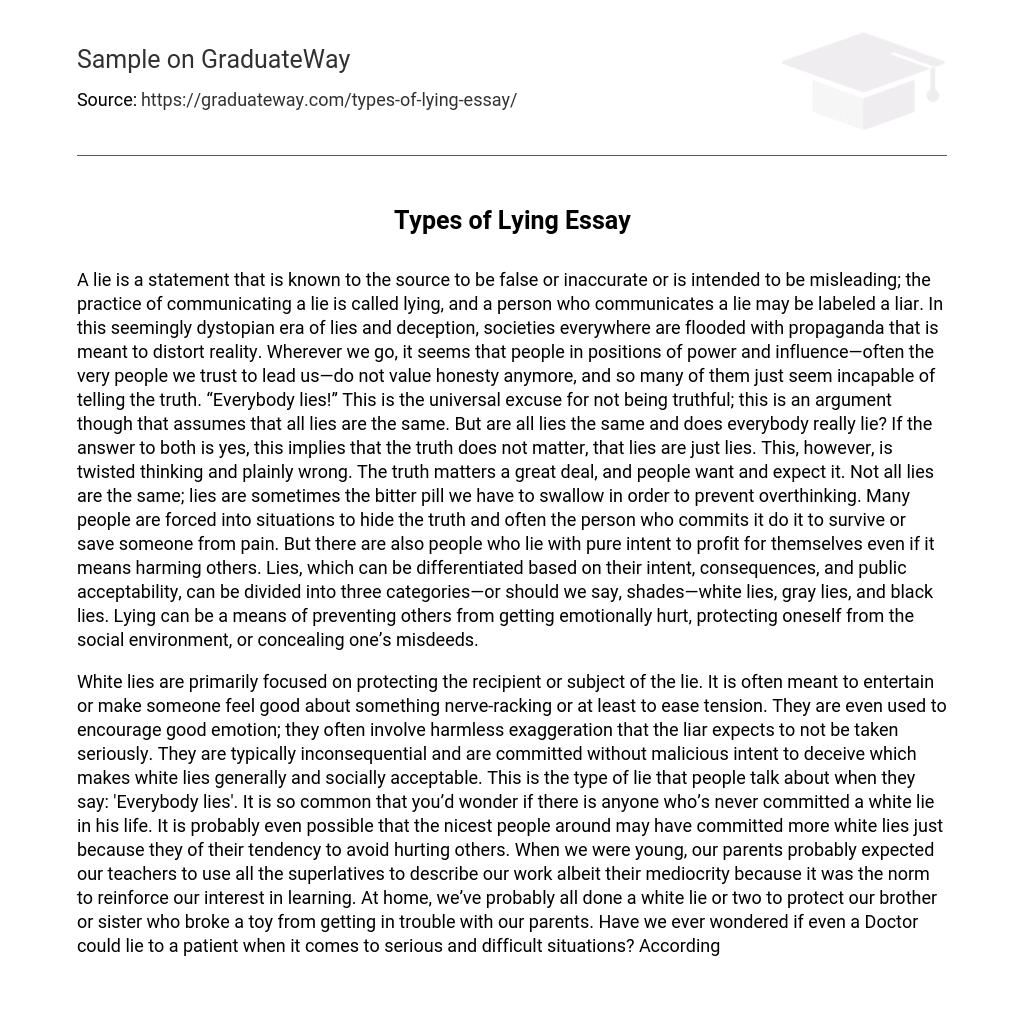A lie is a statement that is known to the source to be false or inaccurate or is intended to be misleading; the practice of communicating a lie is called lying, and a person who communicates a lie may be labeled a liar. In this seemingly dystopian era of lies and deception, societies everywhere are flooded with propaganda that is meant to distort reality. Wherever we go, it seems that people in positions of power and influence—often the very people we trust to lead us—do not value honesty anymore, and so many of them just seem incapable of telling the truth. “Everybody lies!” This is the universal excuse for not being truthful; this is an argument though that assumes that all lies are the same. But are all lies the same and does everybody really lie? If the answer to both is yes, this implies that the truth does not matter, that lies are just lies. This, however, is twisted thinking and plainly wrong. The truth matters a great deal, and people want and expect it. Not all lies are the same; lies are sometimes the bitter pill we have to swallow in order to prevent overthinking. Many people are forced into situations to hide the truth and often the person who commits it do it to survive or save someone from pain. But there are also people who lie with pure intent to profit for themselves even if it means harming others. Lies, which can be differentiated based on their intent, consequences, and public acceptability, can be divided into three categories—or should we say, shades—white lies, gray lies, and black lies. Lying can be a means of preventing others from getting emotionally hurt, protecting oneself from the social environment, or concealing one’s misdeeds.
White lies are primarily focused on protecting the recipient or subject of the lie. It is often meant to entertain or make someone feel good about something nerve-racking or at least to ease tension. They are even used to encourage good emotion; they often involve harmless exaggeration that the liar expects to not be taken seriously. They are typically inconsequential and are committed without malicious intent to deceive which makes white lies generally and socially acceptable. This is the type of lie that people talk about when they say: ‘Everybody lies’. It is so common that you’d wonder if there is anyone who’s never committed a white lie in his life. It is probably even possible that the nicest people around may have committed more white lies just because they of their tendency to avoid hurting others. When we were young, our parents probably expected our teachers to use all the superlatives to describe our work albeit their mediocrity because it was the norm to reinforce our interest in learning. At home, we’ve probably all done a white lie or two to protect our brother or sister who broke a toy from getting in trouble with our parents. Have we ever wondered if even a Doctor could lie to a patient when it comes to serious and difficult situations? According to clinicians Korsch and Harding, “The information a doctor gives a patient should be tempered by who the patient is and what he or she is ready to hear” (102). One anonymous doctor admitted to lying about a complicated medical result and relayed it as simple and lightly as possible in order to ease tension with regards to the patient’s reaction and the doctor wanted to make sure that the tests were accurate to avoid being sued. Though these statements are more meant for easing emotional breakdown than truth; they are generally ethical and evidence suggests that actual disclosure rates are as low as 6% (Palmieri, MD and Stern, MD). To the purists of course, a white lie is just as bad and violates a person’s right to correct information. But to most people in general, inconsequential white lies are normal, at times even a necessity to foster positive relationship and promote peace. A much darker shade of lie, however, has a deeper impact on a particular person or a society; this type of lie can be socially acceptable but certainly not ethical most ways.





